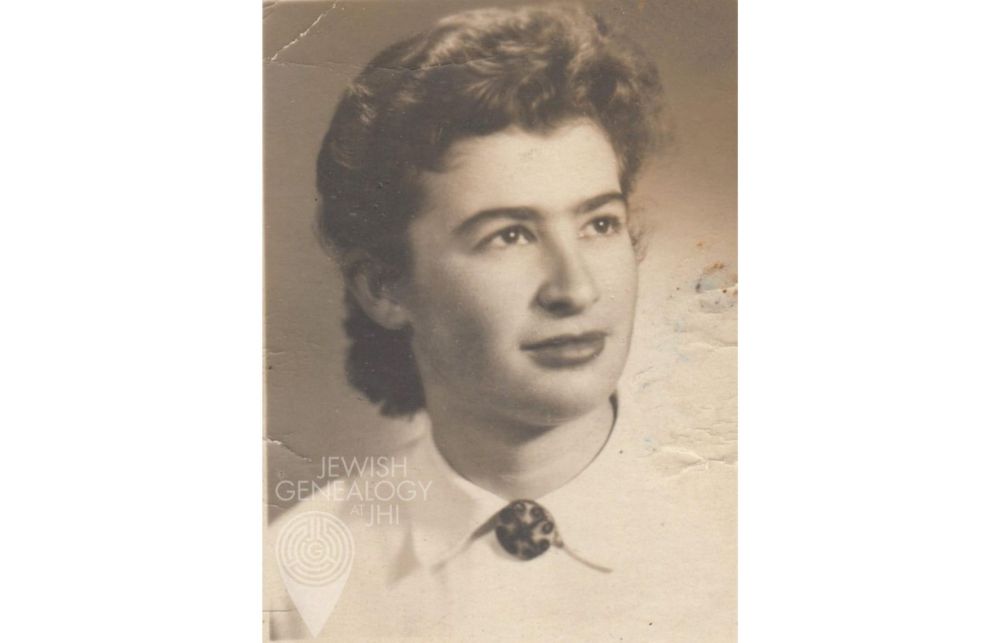- News
- Events
- Oneg Shabbat
- Collections
- Research
- Exhibitions
- Education
- Publishing Department
- Genealogy
- About the Institute
- Bookstore

,%20archiwum%20rodzinne,%20zdjęcie%20z%20młodości_szeroki.jpg)
Emilia Barbara (Syma), photo from her youth. Family archive
![Teatr_Letni_Ogród_Saski.jpg [438.04 KB]](https://www.jhi.pl/storage/image/core_files/2022/9/5/b0981ec546932e09eeb1156758dbbd9a/jpg/jhi/preview/Teatr_Letni_Ogród_Saski.jpg)
The Jewish newspaper "Der Frajnd" was found in the cart, and because of this newspaper, the police officer decided to escort the child to a Jewish orphanage at 26 Płocka Street. There, no evidence of the Jewish identity of the girl was found and admission was refused (see the short letter signed Dr. M. Mayzner). The orphanage refused to admit the kid, so the police officer took the little girl to the Boduen orphanage at Nowogrodzka Street. In January of the following year, she was baptized and named Emilia Barbara.
Emilia Barbara (Syma) in childhood. / Note by dr. Mayzner. / Information about the baptism of the girl / Press article about the trial
A childless couple became interested in Emilka. Colonel Walerian Wieleżyński, 38, commander of the KOP in Malinów (Korpus Ochrony Pogranicza/Border Protection Corps), with his wife Stanisława, 30. They intended to adopt her, visited her, and send her toys and money for maintenance. The adoption process was almost finalized in February 1936, but on the same day, when the Wieleżyński family came to pick up Emilka, her mother, Rywka, appeared on the doorstep of the orphanage.
Rywka was born in 1914 in Popowo Kościelne, located near Wyszków (ווישקאָוו, approximately 60 km northeast from Warsaw).
She was probably the youngest child in her family. Her parents were Josek Zelik Kuropatwa and Syma nee Wajnkranc and her two sisters, the only siblings we know about, were 18 and 20 years older. After her marriage to Moszek Wiernik, Rywka moved to Warsaw. When her daughter was born, Rywka named her after her deceased mother – Syma. Moszek went away searching for work, and Rywka was left alone with her little daughter, hungry and destitute. In desperation, she decided to give little Syma a chance for a better future and left the stroller with her daughter in the Saski Garden[1], hoping that a wealthy Jewish family would take care of her.
When Moszek returned to Warsaw and got a job in a button factory at 44 Pawia Street, the young parents began to fight to regain Syma, now Emilia Barbara.
In the application, Rywka asks for the possibility of getting the child back.
Rywka describes her situation and disease (she could not have any more children), and mentions having suicidal thoughts.
Emilia stayed in the orphanage, although it seems that both Małyżyński's family and Rywka remained present in the girl’s life for as long as they could.
Emilka’s son is looking for information about Rywka, Moszek and their families. The son only recently discovered that his mother was Jewish and what she went through. Emilia never talked about her life, but she searched for information about her parents long after the war.
Do you have information about Rywka and Moszek Wiernik, Emilka's parents?
Please contact the Genealogy Department of the Jewish Historical Institute:
tel.: +48 602 472 557
tel.: +48 22 828 59 62
e-mail: familyheritage@jhi.pl
Footnote:
[1] The Saxon Garden had an implicit, if not explicit, dress code. Those wearing traditional Jewish clothes, which did not conform to upper-class fashion, were encouraged not to stroll through the gardens. Many of Warsaw's less affluent Jews would opt to take their shabbos shpatziren in nearby Krasiński Garden, not in Saxon Garden.